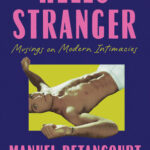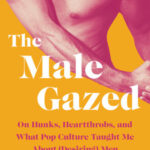Manuel Betancourt
MANUEL BETANCOURT is a queer Colombian culture writer and film critic. His work has been featured in The New York Times, BuzzFeed Reader, Los Angeles Times, Film Quarterly, Los Angeles Review of Books and GQ Style, among others. Manuel is the author of The Male Gazed (Catapult, 2023), Judy Garland's Judy at Carnegie Hall (Bloomsbury Press, 2020), and a contributing writer to the Eisner Award-nominated graphic novel series, The Cardboard Kingdom (Knopf Books for Young Readers, 2018 & 2021).
Subscribe to our newsletter for news & events from Catapult.
Books
Hello Stranger
Musings on Modern Intimacies
Witty and winkingly playful, Manuel Betancourt’s Hello Stranger explores modern queer romance and the expansive possibilities of ephemeral intimacies“Hello stranger.” As an opening line, you really can’t ask for better.
Hello Stranger is a book about chance encounters—at a bar, through social media, in a bathhouse—and what a stranger can reveal about who we are and who we could still yet be. A stranger, after all, is a site of endless possibilities.
As Manuel Betancourt looks back on his past relationships, he turns to characters and narratives that helped him question notions of what monogamy and coupledom (and relationships and marriage) can and should look like. From films like Before Sunrise and Cruising to the poetry of Frank O'Hara and the musicals of Stephen Sondheim, Betancourt uses pop culture to make sense of the alluring prospect of forging intimacies with strangers—even, or especially, the strangers within ourselves.
At once a personal excavation and a broad cultural critique, Betancourt grapples with everything from online sexting and real-life cruising to divorces and throuples. Hello Stranger examines the intimacies we crave, value, and oftentimes destroy with rote familiarity.
The Male Gazed
On Hunks, Heartthrobs, and What Pop Culture Taught Me About (Desiring) Men
Featuring deep dives into thirst traps, drag queens, Antonio Banderas, and telenovelas—all in the service of helping us reframe how we talk about (desiring) men—this insightful memoir-in-essays is as much a coming of age as a coming out bookManuel Betancourt has long lustfully coveted masculinity—in part because he so lacked it. As a child in Bogotá, Colombia, he grew up with the social pressure to appear strong, manly, and, ultimately, straight. And yet in the films and television he avidly watched, Betancourt saw glimmers of different possibilities. From the stars of telenovelas and the princes of Disney films to pop sensation Ricky Martin and teen heartthrobs in shows like Saved By the Bell, he continually found himself asking: Do I want him or do I want to be him?
The Male Gazed grapples with the thrall of masculinity, examining its frailty and its attendant anxieties even as it focuses on its erotic potential. Masculinity, Betancourt suggests, isn’t suddenly ripe for deconstruction—or even outright destruction—amid so much talk about its inherent toxicity. Looking back over decades’ worth of pop culture’s attempts to codify and reframe what men can be, wear, do, and desire, this book establishes that to gaze at men is still a subversive act.
Written in the spirit of Hanif Abdurraqib and Olivia Laing, The Male Gazed mingles personal anecdotes with cultural criticism to offer an exploration of intimacy, homoeroticism, and the danger of internalizing too many toxic ideas about masculinity as a gay man.
Catapult | Counterpoint | Soft Skull
20 Jay Street #704
Brooklyn, NY 11201
646.926.0805 | contact@catapult.co
20 Jay Street #704
Brooklyn, NY 11201
646.926.0805 | contact@catapult.co






